#references to greek myth
Text
Blooming in the Bitter Snow (Right Before the Dawn)
Fandom: Doctor Who
Ships: Thirteenth Doctor/Yasmin Khan
Characters: Thirteenth Doctor, Yasmin Khan
Rating: General
Word Count: 3,636
Other Tags: Revolution of the Daleks, References to Greek Myth, Doctor Who: Flux, Character Study, Pre-Relationship
Read on AO3
Summary: After ten months, the Doctor is like the sun: too bright to look at. Yaz knows this will happen again-- but then, the Doctor knows too.
NOTES: this is a birthday gift for katniss but i guess the rest of you can read it too. it is also retribution for getting me into hadestown. anyway happy birthday ❤️❤️❤️
(and shoutout to gabe riptheh for betaing if it's bad you have to blame him for not telling me)
title is from hadestown
(hehe note from december felix katniss and i saw hadestown and it FUCKED. don't ask me about reeve carney do ask me about grace yoo)
1.
Yaz is stuck.
Yesterday, she had the universe.
Today, she has Sheffield.
It’s not that Sheffield is bad. Yaz had always lived here, and it's always been fine. She used to like it here, even. Back when she was younger. Back before she knew there were any other options.
But now— there's nothing wrong with Sheffield. It's just not where she wants to be.
She’s back living with her family. Sonya’s taken over her room, so she’s living in Sonya’s, with its awful orange paint and childhood belongings scattered about.
It doesn’t matter, though. Yaz is never home. She’s not at work, either— she quit her job a month ago, in linear time, but it feels like years.
The thing is, though, the stolen, unfamiliar TARDIS has become home and work, as far as Yaz is concerned. At first, it’s because Ravio and Ethan are living there, and Yaz is helping them get sorted with a job for Ravio and a school for Ethan and a proper place to stay for them both— every cell in her body is screaming, Find the Doctor , but Yaz forces herself to focus on the people right in front of her who need help before she goes off in search of someone else. It’s what the Doctor would do, after all.
But then Ravio finds a job, and then a flat, and he and Ethan move out to start their new lives on Earth, and Yaz is stuck. Ryan’s finally gotten a job as a mechanic, and Graham is settling into retirement, but Yaz can’t move past this: the stolen TARDIS, offensive in its blankness. The Doctor, currently defined by the space she’s left behind. And the question: why hasn’t the Doctor come back for her?
Ryan keeps trying to suggest jobs she could get. A social worker, he says, when she’s helping Ravio and Ethan get on their feet. Or a teacher, when she explains Earth history to them. It’s the day the two of them leave, when Ryan suggests Yaz go to school to become a psychologist, that she snaps.
“I’m not giving up on her,” she says, but her voice rises until says becomes shouts, her boots planted on the firm white floor.
“All right, then.” Ryan raises his hands in surrender. “Don’t bite my head off. Just, you know, it’s not all or nothing. You can look for her while you do other stuff.”
Yaz shakes her head, single-minded. “I have to find her.”
Ryan stares at her for another moment, and then he shrugs. “Suit yourself,” he says. “We’ll be around.”
He doesn't offer to help. Yaz doesn't expect him to. Her relationship to the Doctor is— it's different. Ryan and Graham joke around with her, jumping from adventure to adventure. And Yaz likes the jokes, likes the adventures, but— she also likes the late nights wandering the TARDIS until she finds the Doctor in her workshop, tinkering away, and sits on one of the benches as the Doctor narrates her work, occasionally looking up and giving Yaz a bright and earnest grin. She likes the serious moments, when the Doctor meets her eyes and, somehow, makes a tough situation a tiny bit better, just by acknowledging it. She likes seeing the Doctor every day, just knowing she's around. She still can't quite quantify why exactly her relationship with the Doctor is different from Ryan's, but she knows, keenly, that it is.
Ryan leaves, and Yaz gets to work. She's seen the Doctor pilot the TARDIS—she’s picked up a few of the basics. This console looks completely different, but she thinks she recognizes a few of the levers: not well enough to launch herself into the vortex, and definitely not well enough to choose where to land, but well enough that she has a place to start.
The next day, she goes out and buys a pack of sticky notes, three different colors of paper, and rolls of tape.
At first, it’s almost fun— through the haze of her determination, she vaguely processes the joy she usually takes in a good puzzle, having a problem in front of her to solve. She identifies as many of the controls as she can, marking them with sticky notes, taping her notes up on the walls.
It’s only after she’s identified everything she can that the hopelessness sets in. She’s labeled twelve different buttons and levers, but she’s only sure of three of them, and there are countless more. Time travel is complicated, she knows, and dangerous, and it’s already been three months without the Doctor before she’s even managed to start this project. Linear time is ticking away, and the rest of time, the convoluted path only the TARDIS can navigate, remains elusive.
But Yaz can’t give up. She can’t bear the thought of it: going back to her normal life, finding a job she only sort of didn’t hate, leaving the Doctor behind. Especially when the Doctor could be in trouble, in need of the rescue that Yaz is desperate to provide.
So she keeps going. Methodical, she goes lever by lever, button by button, categorizing, speculating, experimenting. As long as she doesn’t hit the lever that’ll actually launch the TARDIS, she figures, she’ll be fine, and so she lets herself poke and prod, taking constant and careful notes.
(It’s pointless. She knows, deep down, it’s pointless. Either the Doctor will come back or she won’t, and there’s not much Yaz can do about it. She’s no Time Lord— she doesn’t know how to pilot a TARDIS. Not really. But if she doesn’t keep trying, she’ll sink deeper into her grief, and she can’t bear the thought. So she tries, again and again, a high-tech Sisyphus, pushing her rock up the hill until it falls.)
Weeks pass. Months.
Every day, Yaz misses the Doctor more.
Ryan and Graham are still worried about her. Her family are worried about her, too, and doubly so because they don't know the truth about the Doctor or time travel or anything else— they only know that Yaz is looking worse with every passing day.
She can’t bring herself to care. She feels numb, dead to the world, anytime she’s not working on the TARDIS. She’s already written off this time— when the Doctor comes back (she has to come back), it will be like this never happened. It will be ghost time, time that passed, but didn’t.
And then, just when Yaz is sure she can’t bear it any longer, there’s the Dalek. Instantly, Yaz shifts her focus: it’s the same as before, with Ethan and Ravio. Even with her burning, desperate need to see the Doctor again, the safety of other people— the safety of the world — comes first.
She’s at Ryan’s and Graham’s kitchen table when she hears it. The most wonderful sound in the universe. Papers are blowing, Yaz’s hair is coming loose, and her eyes slip shut. It feels like she’s ascending, being lifted up through the fog that’s overtaken her in the last ten months— walking up from the Underworld, ready to see the light of the sun.
When she opens her eyes, the TARDIS is there. Steadfast, blue, letters glowing gently.
The door opens.
Yaz is so close to the daylight—
But the second the Doctor steps out of the TARDIS, the second the Doctor’s eyes land on her, her hope crashes into anger, and she’s fallen right back down onto the dirt.
“We were worried about you!”
Ten months. She’s been waiting ten months. It’s felt like the longest winter of her life— and now she’s red hot, burning with the fury of having been left behind.
Even if it’s not the Doctor’s fault.
Even if she knows, full well, the TARDIS is unreliable.
Even if under all the fury, there’s a quieter warmth, a warmth she’d been taking for granted back when the Doctor was around, blooming in her chest and skating across her skin.
(The fury dissipates, somewhat, when she brings the Doctor into the blank white TARDIS, when she sees the Doctor’s mouth drop open as she takes in the notes tacked up on the walls. It drops entirely when the Doctor looks at her with hope-filled eyes and asks if she’s coming along. “Two hearts,” she says. “One happy, one sad,” and Yaz will miss Ryan and Graham, but she can’t help but feel the sun golden on her face when she thinks she’s responsible for the happy heart.)
(The problem, of course, is that Yaz is very, very sure this will happen again. They lead dangerous lives, after all. And the TARDIS is unreliable.)
(The problem, of course, is that tragedy is a cycle.)
Intermission
The TARDIS is just the same as Yaz remembers, with a few exceptions. Steps in the console room, for example. And her room has changed slightly— evolved, perhaps, to fit the new version of Yaz that has emerged from the last ten months. Her bedspread has gone from purple to a red-brown, and the glow-in-the-dark stars on her ceiling have gone from cartoonish to nearly photorealistic, swirling in fluorescent galaxies when she turns the lights off. She collapses into her bed, curling up immediately— she never sleeps as well at home as she does in the Doctor’s TARDIS.
The next morning, she practically runs into the console room, not even trying to suppress her smile. The Doctor is already there, writing in a little notebook, and she turns around when Yaz steps closer, her eyes sparkling.
“Good morning,” Yaz says, suddenly shy. She hasn’t been alone with the Doctor in the TARDIS before. Or— she has, in the sense that they’ve been the only two in the room, but she hasn’t, in the sense that Ryan and Graham have technically always been on board with them, even if they were far out of earshot. It feels different, now there's no chance of Graham wandering in with his tea, or Ryan poking his head through the door to ask if they want to play a video game.
“Morning, Yaz!” the Doctor exclaims. She’s back to her usual bouncy self, of course— she never reveals her sadness for long. “Was waiting for you to wake up.”
Yaz smiles. “What’s in the notebook?”
The Doctor returns her smile with a grin. “How would you like to learn to fly the TARDIS?”
Yaz steps forward, barely believing her ears.
“You mean it?”
The Doctor nods, expectant. An impossible joy rises in Yaz's throat, threatens to spill out her eyes. Maybe, she thinks, it won’t be a cycle after all.
2.
Yaz watches, and the Doctor turns to stone.
She can’t help but feel like her watching is what does it. Even though plenty of others are looking on, immobilizing the Doctor as wings sprout from her back.
The angels’ weakness is in their observation, after all, and Yaz keeps watching the Doctor, even when she shouldn't.
She almost dies, lunging forward, desperately reaching. It’s Dan who saves her, pulls her back, keeps her from her death.
And that's how she falls for a second time.
It’s different, this time. Less familiar, for one: it’s a hundred years before she was born, in a time when half of England is still using chamber pots, and everything feels strange.
But— the other difference is the Doctor.
She hasn’t left Yaz alone, this time.
Yaz feels the difference the second she and Dan and Jericho and Peggy get back to the village, before she even finds the hologram. She’s already composing a game plan in her mind, just like the Doctor would: get food. Get money. Get period-appropriate clothing. Find a way back to the Doctor.
It’s not until that night that her left hand drops into her pocket and meets cool metal, tugging it out to see the trapped crystal and smooth ridges of an unfamiliar device.
Hope wells up in Yaz. Or— not quite hope. Love , she realizes. Love, because whatever this is, it has to be from the Doctor, and that means the Doctor cared enough about her to leave her— well, to leave her something, even if she hasn't figured out what.
She will find her way back this time.
She doesn’t have a TARDIS, but over the last ten months, she’s learned to trust herself: she’s learned high gravity circus arts, bluffed her way through a peace treaty to rescue the Doctor from a hostage situation, and, in one memorable occasion, defused an actual bomb with one second left on the clock. She’s not the Doctor, but she is good.
By the time they’ve spent two weeks in the empty village, Yaz even has a plan. She’ll spread messages to the Doctor throughout the time period, hoping one of them makes it to the future. Might even try and make one big and permanent enough that the Doctor will see it from space in 2021. And while they’re doing that, Yaz will look for traces of time travel in the 1900’s: the Doctor isn’t the only time traveler out there, she knows, and someone is bound to have abandoned a bit of technology somewhere on Earth. Dan and Jericho are on board— they’re a little taken aback by her fervor, she can tell, but they want to get home.
The hologram, of course, changes everything. It activates when Yaz is doing laundry, her arms burning with the effort of using a washboard. She’s been keeping it in her pocket, her one relic of the Doctor, when suddenly she hears a muffled voice.
The Doctor’s muffled voice.
She pulls the hologram out of her pocket, mouth hanging open, and watches as the Doctor, golden, untouchable, appears in front of her.
Yaz stares at her.
She stares back.
Except— she's not really staring at Yaz, is she? She's staring at the hologram— the hologram that represents Yaz— and—
Has the Doctor been looking at her like this this whole time? With so much emotion in her eyes? Or is she only looking like this because Yaz isn't really there, because it's safe? Yaz is afraid to call the look loving , not when the consequences for being wrong involve the bitterest disappointment, but her breath catches in her throat anyway.
She misses the Doctor. More than anything.
For the next four years, she travels the world. She realizes, at some point in there, that she’s changing— she’s growing into someone new, someone separate from the Doctor, separate from Sheffield, separate from her family and the 21st century. It’s strange. Change is inevitable, of course, but the person she’s becoming is so shaped by the 20th century— shaped by the fashion and the technology and the social rules. She's gotten used to cobblestone streets and horse-drawn buses and traveling miles on rickety trains only to arrive somewhere with no electricity or plumbing, and she has to wonder— when she gets back to the Doctor, to the TARDIS and the convenience of 21st century life, will she even still fit? She still has her smartphone, tucked in a corner of her luggage, and it might even have a little bit of charge left. But she doesn't know, because she hasn’t tried to turn it on in months. She reads newspapers now, anytime she can get her hands on them. She knows how to book tickets by mail to sail abroad, even when her address isn’t quite fixed. She can lace her own corset and do her own hair in the complicated styles of the day, and after a few months of wearing impractical skirts and itchy collars, she’s finally found clothes that suit her. She’s formed an identity for herself, in this era, an identity that’s completely hers.
And yet, she doesn’t belong.
It’s not her era. It’s temporary, she knows it is. She will see the Doctor again. She will go home. And if she doesn’t belong in Sheffield anymore— well, she’ll have the TARDIS, all of time and space, to help her readjust.
It does remind her of the ten months. She says as much to Dan and Jericho, detailing those awful days and nights spent in the wrong console room. She’s got the same dull sense of detachment, the same laser focus on the Doctor.
But… it’s different now. She knows what she has to do, and she knows how to do it. Even if she’s still not sure how she’s going to get back to the Doctor— even if some days, her mission is just, “Keep Dan and Jericho alive.” She's figured out how to fake it, how to act like she knows what she's doing, and slowly she realizes she actually knows. Maybe she knew this whole time. She manages to smooth-talk all three of them onto ship after ship, she manages to bandage a gash in Dan's arm with a piece of her own corset cover while camping deep in the woods, she manages to dispose of a dead body without a second thought. She's always prided herself on doing the things that need to be done, after all— if those things have evolved from tricky homework assignments and white lies to her parents to wilderness medicine and corpse disposal, well, that hardly matters. It's still got to be done.
And, of course, she has the hologram. A ghost of the Doctor, keeping her company. Or maybe Yaz is the ghost, stuck in the past— it’s hard to tell, sometimes. Although— she doesn’t feel dead, this time. Not like before, when she barely went through the motions of keeping herself alive, when she did the same tests on the unfamiliar TARDIS every day until it became familiar but still impenetrable. She’s no longer a high-tech Sisyphus— she’s Odysseus, maybe, displaced in time as well as space, and sailing the high seas in the hopes of making it home. Odysseus has a crew, has control.
Yaz always said she wanted to be in charge.
She’s in charge now, leading Dan and Jericho through a convoluted set of tunnels. Technically Dan’s the one who knows the tunnels best, but they’re all used to Yaz being in the lead, and it’s a hard habit to break. So she’s in front, trying not to let herself hope too hard, trying to tamp down the feeling that she’s walking upward again, out of the Underworld, towards the 21st century sunlight. It’ll hurt too much if she’s wrong— if she falls again— but—
But she’s right.
There’s a door to 2021.
After four years of searching, it turns out it’s as easy as stepping across a threshold, swapping one tunnel for another. Yaz almost cries when she sees the modern font on clean plastic mounted to the wall, part of a museum display— and again when she sees the TARDIS, solid, stalwart. If it weren’t for the stranger in front of her, blocking her, Yaz would be running right to it, opening the doors, flying away.
The good news is she doesn't have to. The Doctor appears, suddenly, miraculously, and when the Doctor appears—
She’s like the sun. She really is. Yaz has finally made it up to the Earth's surface, and now, after years in the darkness, she feels light again. The universe is ending, but the light is soft on Yaz's face.
For a split-second, she’s afraid of the Doctor seeing her. She remembers last time— standing in Graham’s living room, full of hope and whispered prayer, but then the Doctor looked at her, and the hope crashed into anger, plunging her back into a roiling darkness.
But things are different now.
When the Doctor looks at Yaz— it’s like she sees her. She sees everything. Yaz is mesmerized. She can’t look away.
There’s a lot going on, and the Doctor is frenetic, distracted, but she still takes a moment to pull Yaz into a hug, and the way she melts into Yaz’s body, just for a second, brings Yaz completely back to life, heals any lingering wounds, if only for the moment. And then the way she looks at Yaz when she asks if she’s okay—
She does look at Yaz like that, then, even when it’s not a hologram, when there’s no time or space between the look and its recipient.
Or at least, she does now.
(The problem with tragedy is that it’s a cycle, and the problem with cycles, of course, is that they can be broken.)
Coda
Yaz steps into the console room. She’s back in 21st century clothes— slipping into the world of the living, finding her foothold.
The Doctor, standing at the console, straightens up. She looks tired, a weight in her shoulders and in the droop of her eyelids. Her eyes meet Yaz’s, and Yaz feels the corners of her lips rising into a smile.
The Doctor smiles back. Not one of her big showy grins— no. She’s not performing right now. This smile is genuine. It’s real.
“I really did miss you,” she says, her voice soft.
“You, too.” Yaz is awkward, suddenly. She’s forgotten how she used to act around the Doctor. In four years, she’s been an adventurer, she’s been a friend, she’s been a codebreaker and a sailor. But she hasn’t been a copilot.
There’s an awkward silence, stilted in the presence of all their time apart, everything they haven’t said.
“I was thinking,” Yaz blurts out. “We should invite Dan along. He was a good sport, back in the 20th century.”
The Doctor nods. There’s a shift in her demeanor, a flickering of a light, and she’s back at the console.
“Brilliant idea, Yasmin Khan,” she says, and Yaz’s stomach flutters to hear the Doctor say her name again.
“Copilot?” she asks.
And at the Doctor’s responding grin, she knows she’s back home.
#doctor who#thasmin#thirteen x yaz#character study#references to greek myth#revolution of the daleks#doctor who flux#pre-relationship#short
2 notes
·
View notes
Text
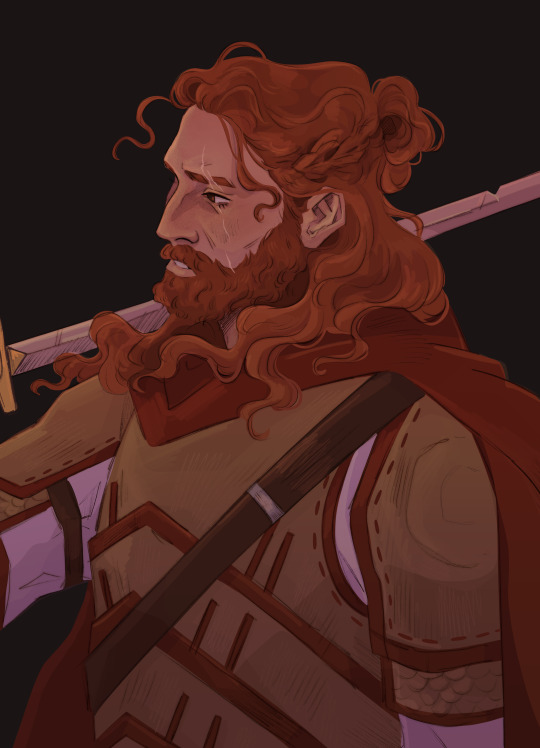
Long hair won out in the end rip all the short haired Menelaus truthers
Art used as reference from littleulvar on twitter: https://twitter.com/littleulvar https://twitter.com/littleulvar/status/1210636583713591296
#His hair is looking ORANGE#Homer like his hair is auburn :/ it’s auburn if u reduce the saturation smh#He turned out weirdly viking esque?? I think it’s the braided hair ??#Majestic if I do say so myself#Menelaus#greek mythology art#my art#the Iliad#trojan war#Greek myth#a#Also an ATTEMPT was made at Bronze Age armour#I don’t know if my reference was reliable#fuck it we ball
4K notes
·
View notes
Text
for Odysseus’ name to become synonymous with journey; Odyssey- he has lost his humanity; even after he dies and his body burnt to ashes on a pyre he won’t enter Hades. he will be damned to a thousand more journeys, a thousand more trials and a thousand more deaths. his spirit floats through the plays that recite his journey, echoes through the songs sung about him, his pain seeks through every epithet. Sacker of cities. Great glory of the Achaeans. Mastermind of war. Master mariner. Man of pain.
he will be damned time and time again to suffer and reach home for it to be torn out of his grasp each time. he will reach where the river styx fades into Hades and see the descent and before he can feel relief he is back where he started. He is in Troy. He is in a boat in an unfamiliar land, but it has his name. He is in Troy again, but not the same one he raided and burnt. he is floating through the aether. he is not a man anymore. nor is he monster. he is a Thing, an Ideal; akin more to Thanatos or Hypnos or Eris in he is no longer Odysseus he is the personification of journey.
If there truly are three deaths; one of the mind, one of the heart, and one of the memory. then Odysseus has become immortal and yet he begs for death. he no longer knows whether he begs for the peace of Hades or to truly be forgotten, to truly cease to be
#greek mythology#greek myth#odysseus#the odyssey#yes this is about the moon thing#this feels like a mischaracterization but#idk#this isnt accurate to greek myth#the line about troy but not the same troy#that’s a reference to how i think there’s a few towns around the US at least named Troy#one’s in Virginia
157 notes
·
View notes
Text
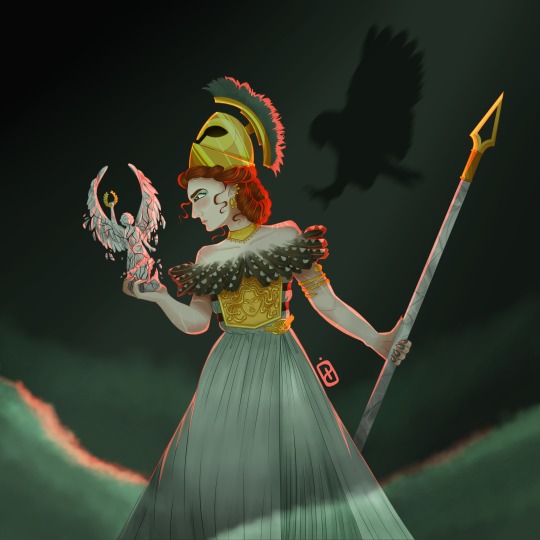
🤍The feathers are from an owl called "Athene noctua" and is associated with Athena/is believed to be Athena's owl
🤍The statue she is holding is Nike, goddess of Victory and often paired with Athena (and no, that's not a weeping angel)
🤍The cobweb on the necklace (for Arachne) and Medusa's face are to represent old grudges Athena has (very prideful indeed)*
🤍Apparently emerald green was a colour associated with Athena. I love the way green looks with Teagan's red hair so I just went with it 😊
*Edit/small note : Athena is known for not being a girl's girl. But it's also quite well known that stories are often translated by men who like to pit women against each others. There are multiple versions of each Greek stories. For Medusa, some say that she was turned into a monster by Athena because she was in the wrong. Others say that she was turned that way out of mercy from Athena, so that she would never be hurt by men again. For Arachne, some say that she was turned into a spider because she won and Athena was too prideful to accept her defeat. Others will say that she lost against the goddess and k*lled herself. She was changed into a spider by Athena so she could keep weaving for all eternity.
I think these two elements can either be seen as old grudges Athena has or testimonies toward these two people she couldn't save on time (add the spear for Pallas into that but that's another story). Imo, the lyrics I was inspired by in My goodbye (selfish and prideful and vain) can be interpreted like Odysseus having actually no idea what really happened, or him being actually right and Athena being all of these. Anyway, I love all the layers in every song !
#athena goddess of wisdom#athena goddess of wisdom and holding grudges#athena#epic the musical#my goodbye#how many references to past myths can I include in this drawing#my own design#I had fun drawing it#teagan earley as athena is top tier casting#my greek mythology obsession is coming back full force#greek myth art#odysseus
79 notes
·
View notes
Text
Hera: oh I’m pregnant.
Zeus: who’s is it?
Hera: mine?
Zeus: well it takes two to tango so who else’s is it?
Hera: just me and myself.
Zeus: oh slay.
#you could swap them and it would still work#greek mythology#greek gods#greek myths#queque#greek myth memes#incorrect quotes#incorrect greek gods#zeus#hera#zeus x hera#hera greek mythology#zeus greek mythology#this is in reference to hephaestus btw#also would zeus even say slay? I don’t think so but I’m not thinking of anything else
153 notes
·
View notes
Text
looking very closely at the website neighborhood and here's some little things i noticed (plus some overthinking & flower symbolism):
~ the only butterflies on the "map" are the ones outside of Frank's house, and the single one outside of Eddie's.
~~ i think the flowers outside of Eddie's are either hyacinths or lavender. given that the flowers are different colors, they're probably hyacinths. which is a Fascinating choice to me, because hyacinths can symbolize regret, devotion (especially beyond death), love, forgiveness, and jealousy - depending on the flower color. Eddie has light blue, dark blue, and purple. The butterfly is landing on the purple one (sorrow, mourning, forgiveness, regret, devoted love).
~~ its also Fascinating because the myth behinds hyacinths is about the greek god Apollo and his (male) human lover, Hyacinthus. they were playing discus (metal frisbee). Apollo threw the discus too hard, and it bounced back and hit Hyacinthus, killing him. devastated, Apollo grew the hyacinth flower from Hyacinthus' spilled blood. SO THE FACT THAT EDDIE, GAY PUPPET EDDIE, HAS HYACINTH FLOWERS OUTSIDE THE POST OFFICE IS UM. INCH RESTING!
~~ (also also in the myth, Apollo wanted to rescind his immortality to join Hyacinthus in his death. and in an alternate version of the myth, Hyacinthus was technically murdered, because Zephyrus was jealous that Apollo preferred a mortal over him & purposefully blew the discus off course to strike Hyacinthus. things to think about. yes, in this whole myth metaphor im viewing Eddie as Hyacinthus and Frank as Apollo. do with this what you will)
~ All of the trees in the neighborhood are in the same general style, except for the tree outside of Sally's home, which is a pine tree. i wonder why!
~ the only buildings with second floors are Barnaby's, Frank's, Sally's, and Poppy's homes. rip the "wally falls down the stairs" memes
~ there's a teeny tiny Home in the post office display window
~ Julie's house has quite a lot of heart symbolism. like, a weird amount. an amount to the point where i now have an entire theory around what her role and arc might be. i Will talk about it with minimal prompting.
~ one of the swingset balloons has a happy face balloon with its eyes closed, which stands out to me (and fuels my julie theory)
~ the only neighbors who don't have flowers outside of their buildings are Sally, Julie (disregarding decoration), and Howdy.
~ Poppy has daffodils, which symbolize rebirth, new beginnings, resilience, and hope. however, they have a negative side of selfishness.
~ Barnaby has red, yellow, and blue tulips. red means undying love, admiration, and truth. yellow means "there's sunshine in your smile", joy, happiness, friendship - But it can also mean unrequited love or jealousy. Blue means individuality, trust, and good luck
~~ note that there's a dead/trampled white tulip. white tulips symbolize sorrow, "my condolences", apology, honor, purity, faith.
~ Frank has sunflowers, daisies, and some others, but those i think are more generic, unspecific flowers for added decoration. i couldn't find a "red flower on vine" that fits the general look of the ones on his house. now, sunflowers symbolize adoration, loyalty, longevity, happiness (also, might i add that these flowers are from another greek myth about apollo, this one where Apollo turns a jealous nymph into a sunflower for snitching on his mortal lover, which got her (the lover) killed. inch resting indeed.)
~~ also blue daisies, which i am assuming are the blue flowers outside his house, symbolize freedom, trust, loyalty, confidence, and honesty. lots of positivity surrounding Frank's house!
~ Wally has daisies. these symbolize innocence, purity, new beginnings, hope, and affection. it can also symbolize the ability to keep a secret. a fun fact i found interesting is the word daisy comes from an old english word meaning "day's eye."
~~ do i believe these flower choices were purposeful? maybe. probably. it does seem strange that there are specific, distinct flowers drawn in equally specific parts of the "map", while a couple of generic "cartoon" style flowers are sprinkled throughout
~ three green apples are growing on the tree next to Howdy's Place
~ it stands out to me that the bodega window above the fruit stands is completely blacked out. no window shine or nothing
~ Sally's "yard" is weirdly barren. everyone else's buildings (excluding Home) has several things decorating the surrounding area. all she has is a spotlight and a tree.
~ Barnaby's house having paint all over it (and a paintbrush & can next to it) is just cute to me. it makes me think that he wanted to paint like his lil' buddy Wally and just went ham with it. or it was a team effort between them<3
~ it took me a while to notice the tiny "Eddie's" painted above Post Office. it gives the vibe (to me) of him tacking on the "Eddie's" to make the office feel more like his. maybe he saw the sign "Howdy's Place" and decided to paint his name on his building to make himself feel more established and at home
~ there's something on / part of Frank's roof. i don't know what it is. if anyone has an idea please tell me its driving me insane. at first i thought it was a chimney but theres two? making an additional symmetrical structure? idk!!
~ there are only three buildings with straight up rainbows. Eddie's post office (hanging from the roof and in the window), Sally's house (the entire front), and Frank's house (butterfly on the door wreath. i almost didn't catch it, it's a sneaky one!)
#conclusion: i am definitely overthinking but being proven wrong through discovery is half of the fun#(and turning out to be either right on the money or even partially-right is the other half of the fun)#its just!!! its really strange how fitting some of the flower choices are!!#eddie has flowers that are 'from' a greek myth about tragic gay love.#barnaby has a trampled tulip that is often used as a sympathy funeral flower. along with all of his other character references to death#frank has one of the few flowers other than hyacinths that directly links to a greek myth where apollo's mortal lover dies tragically#(which is just a weird coincidence if you ask me. the canon lovers both having greek myth apollo based tragic love flowers)#wally has flowers that symbolize keeping secrets and whos etymology is literally 'days eye'. him. the eye contact connoisseur#who's from something that puts emphasis on daytime while spurning night as something forbidden#ITS JUST!!!! WHY DOES IT FIT SO WELL!!!!#either these are some craaaaazy coinkydinks or this was Purposeful.#my flower-symbolism loving ass is chewing on this like a rabid dog#welcome home#welcome home puppet show#welcome home speculation
161 notes
·
View notes
Note

Real!!! Athena, badass in the arena, unmatched, witty, and queen of The best strategies we've seen!!!!

My happy accident here was that she looks like @su-alteza-emia lmao
#athena#duolingo#greek pantheon#greek myth art#greek mythology#greek mythology memes#moony 🎑#digital drawing#digital fanart#digital illustration#i even added the google snake from the Google snake game#and apples apple cuz of the Liad#epic the musical#reference kinda#art tag
225 notes
·
View notes
Text
The fact that Horace (Ranger’s Apprentice) was the sunrise warrior in book 8 and the fact that Horus (Egyptian god) was a sun god is a connection that I don’t think Flanagan intended but is still very special to me
#I love modern writing with references and inspiration from ancient mythos#but not Greek mythology#I don’t have anything against Greek mythology#it’s just overdone in modern writing#like bitch there are so many fascinating myths and pantheons out there#you’re allowed to write a story inspired by huitzilopochtli or something#but no yea good ol’ Zeus hasn’t gotten enough spotlight I guess#rangers apprentice#horace altman
40 notes
·
View notes
Text
Kronos: No man can defeat me.
Persephone: I am no man.
#incorrect greek gods#incorrect greek quotes#greek mythology memes#incorrect greek myths#greek mythology#greek myths#greek gods#incorrect greek mythology#incorrect lore olympus quotes#lore olympus#lore olympus webtoon#lotr reference
293 notes
·
View notes
Text
something something titans something something the prophecy specifically calling the earth “her” something something gaia
#i feel like. idk i may just not notice yet but i feel like the biblical references in deltarune are more obvious#but im fascinated by the connections my sleep deprived brain can make with it & greek myths as well#txt#also i’m aware earth is usually gendered as she i am aware this me thinking too hard im just having fun
20 notes
·
View notes
Text
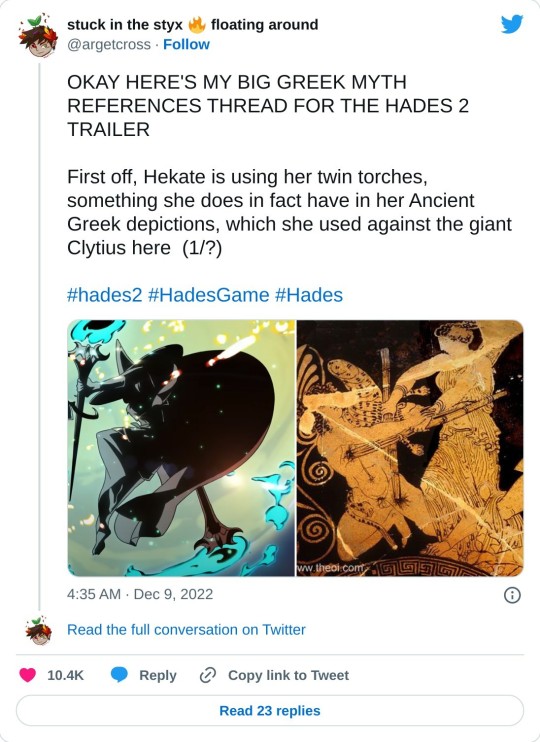
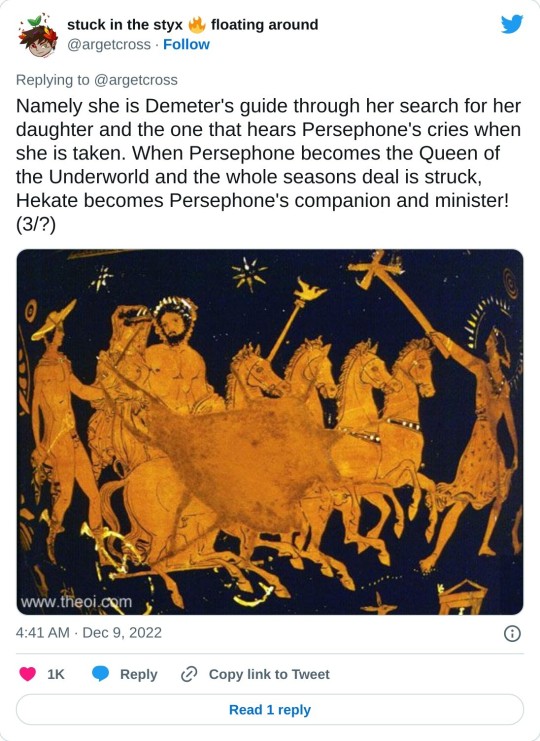
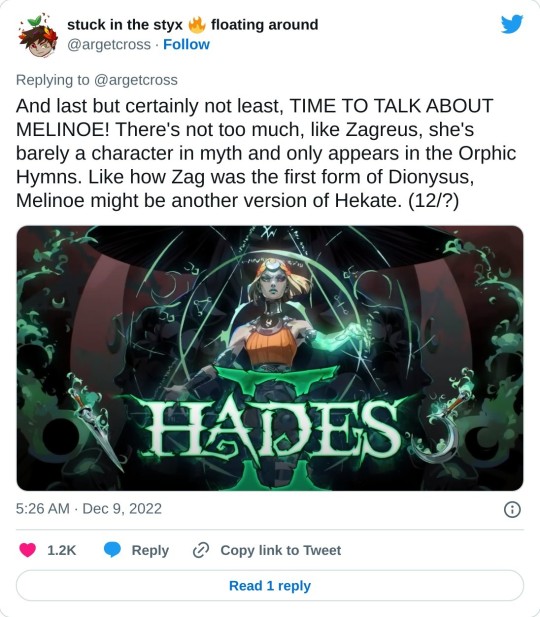
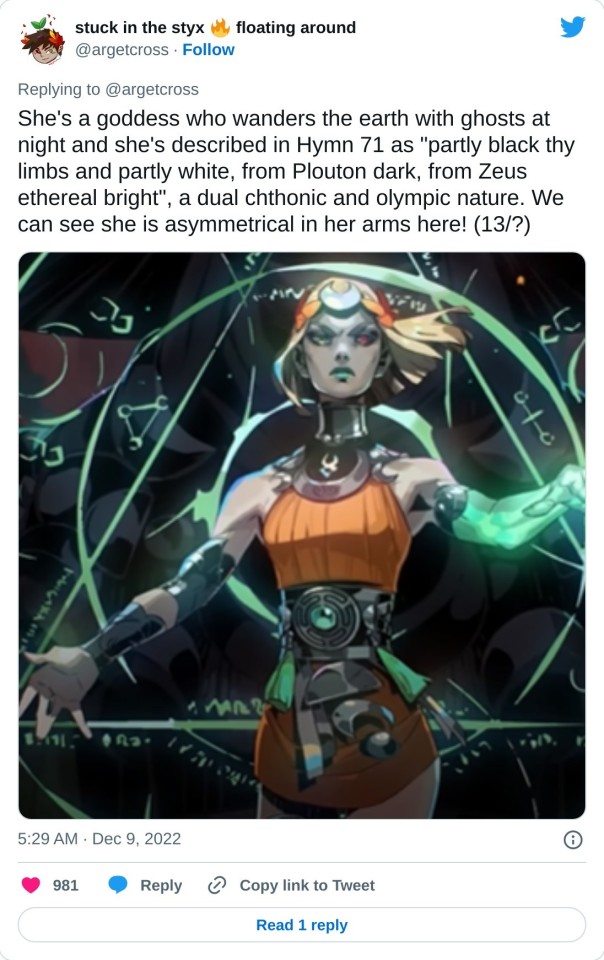
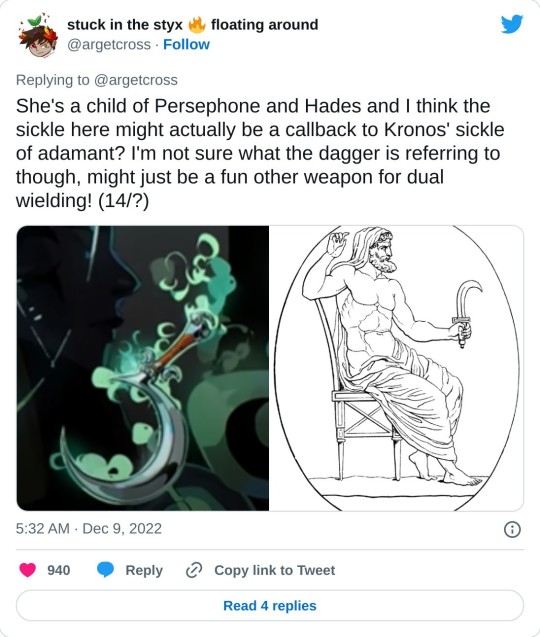
#hades#hades2#hades ii#videogames#supergiant games#references#mythology#greek myth#mythology folklore legends
154 notes
·
View notes
Text

Aeneas get ur ass to Italy
#I hope the Latin is the correct line I did some crazy mental gymnastics cross reference#I do not know latin but I recognise the word blood#But anyways this scene is so horrific thanks virgil#And then the tree is like why did u did u tear off my flesh aeneas#And then the tree is a guy??#Does Aeneas need more trauma#im meant to be revising for my world of the hero test and I’m here drawing aeneas#It’s revision technically#my art#The aeneid#aeneas#greek mythology#greek myth art#aeneas art#the iliad#Fanart#roman mythology#U can tell I used myself as reference bc of the bad posture
397 notes
·
View notes
Text


Ok I only have a few ways of proving this guy is a reference to Appleseed (Masamune Shirow's unloved stepchild to Ghost in the Shell) BUT NO ONE CAN FOR SURE PROVE IT'S NOT
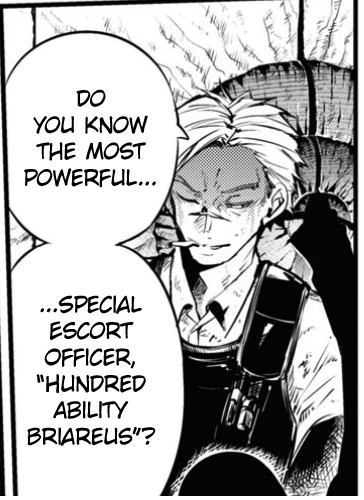
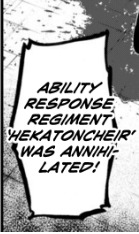
So basically my issue is the usage of the term "Hecatonchires" aka hundred-handed ones. The first time the term is heard is when we see Chuuya's entrance in Chapter 95/Episode 56, where it's the name of a team. The second usage of the term is during Chapter/Episode 57, the character, Briareus, a security officer, refers either to himself as having the strength of a hundred-hands or having an ability equal to the strength of a hundred-hands. So either "Hecatonchires" refers to a TEAM, a PERSON, or an ABILITY.
Now, in Greek mythology, the Hecatonchires were, of course, the hundred-hands ones, super-strong workmen. Briareus was the most famous one. In Appleseed, which borrows almost all of its names from Greek mythology, uses the term "Hecatonchires" to refer to the cybersystem integrated into the brain, which helps cyborgs to control their limbs. More than one person can be a Hecatonchires cyborg. The protagonist of Appleseed, is, of course, Briareos. He makes use of "Hecatonchires" as his surname.
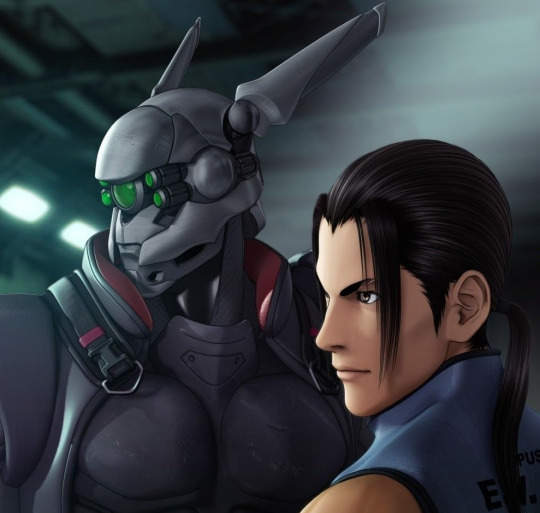
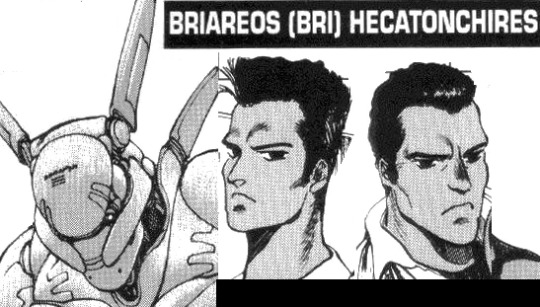
Now, obviously this blond, non-cyborg guy who only shows up for one page/minute in BSD is more likely to be a reference to straight-up Greek mythology than another animanga, HOWEVER, here's points in my favor:
He's NOT overtly based on an author or the literary work of one of the other characters
Asagiri does NOT typically make use of references to Greek mythology/it's not his modus operandi
When you Google the name, Appleseed comes up BEFORE the myth, since it's not a relatively popular one
He is NOT Japanese
His appearance is just brief enough to function as a cameo
SIXTH AND MOST IMPORTANTLY: he works in SECURITY


Briareos in the Appleseed canon works as a security officer: first for the Special Security Forces, where he meets the other protagonist, Deunan, and then they work together in E-SWAT. If the Briareus in BSD had literally any other career or we saw his ability and he literally had a hundred arms or was super-strong or something, I'd write it off as a mythology reference. Otherwise? That guy is Briareos to ME (AND he goes through a horrible accident that should otherwise kill him. So maybe he'll come back as a cyborg. If I'm lucky.) AND I know that Asagiri DOES occasionally borrow inspiration from other media so why not
#bungou stray dogs#bsd#bungo stray dogs#appleseed#briareos hecatonchires#bsd season 5#bsd s5#bsd 5#bungou stray dogs season 5#briareus#that or it's a reference to dante or christie#they liked their greek myths too#EVEN SO i think it's convenient that he's a security officer!!!#text#anime#manga
32 notes
·
View notes
Text
Star vs the forces of evil reference
*If y/n was a goddess and lived on mount Olympus*
*Y/n on trial*
*Exhibit B*
Judge: is it true that you abandoned you’re husband Zeus *Y/n looks away in disgust of Zeus* and you’re kingdom to Elope with an endless!
Y/n: *looks at Morpheus and smiles*
Y/n: yes, I did ran off with an endless but could you really blame me? How could I resist such a handsome face 🥰
*Morpheus blushing*
*court writing*
The Sandman fandom:
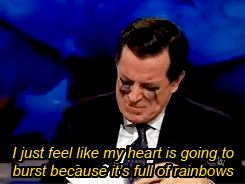
#y/n#morpheus x reader#morpheus headcanons#lord morpheus#morpheus fluff#morpheus x y/n#goddess#the sandman morpheus x reader#the sandman dream x reader#fandom#comic fandom#the sandman netflix#zeus god#greek myth au#star vs the forces of evil#reference
248 notes
·
View notes
Text
Finding out Odysseus's maternal grandfather was Autolycus, a literal thief and son of Hermes, implies to me that he did not get his cunning from Laertes. It also makes me want to write about Autolycus and Anticlea as a father-daughter crime duo scamming all the rich and powerful of Ancient Greece. Because you can't tell me the man wouldn't have taught his daughter a thing or two.
#greek mythology#greek myth#odysseus#the odyssey#autolycus#anticlea#i'm just saying these characters are obscure/minor enough that you could get away with a few creative liberties#could even throw in some references and allusions to the odyssey if you're feeling fancy#maybe make some use of that grove from the final book of the odyssey
34 notes
·
View notes
Text
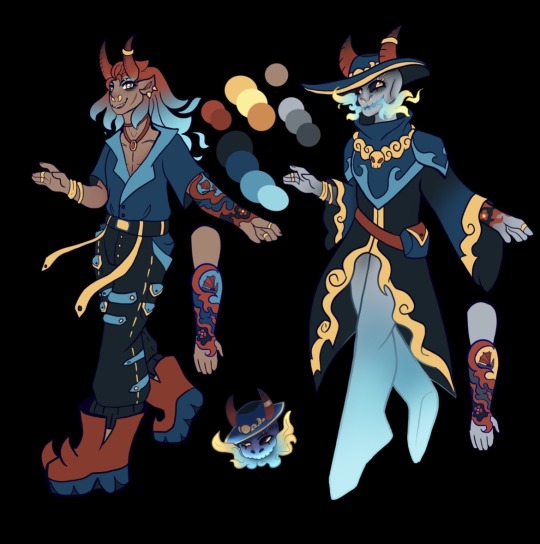
Charon, the Ferryman of the Abyss of The Damned! He functions as a sort of demi-god like entity beneath Althex, the God of The Dead and Banished. Art by FableFox
#oc artwork#paradox universe#oc art#character reference#charon#charon the ferryman#ferryman#ferryman ultrakill#ghost oc#oc#oc shit#artwork#ghost art#greek charon#greek mythology#greek myth art#original universe#original character#ghost dimension#spaceferren comics
8 notes
·
View notes